isis
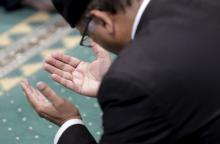
Recently some American politicians have made shocking comments regarding Muslims — shocking because they have been cheered on and gained political mileage; shocking because the politicians pretend they are honoring the U.S. Constitution; and shocking because the politicians are willing to overlook the Constitution’s guarantee of equal rights for all in order to dehumanize Muslims.
American Muslims feel sad, depressed, and frightened about this trend. Fascism takes a long path, but it starts this way. At the same time, we are optimistic that these days that are upon us will pass and that Islamophobic politicians and their backers will fade in due course.
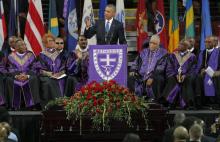
Religion inspired countless other acts of forgiveness, mercy, and hope this year. But religion — or perversions of it, some would say — also inspired horrific violence: the “faith-based” cleansing of ancient lands, and bombings and shootings motivated by scriptural justifications. It was a year also of religious-inspired activism, seen perhaps most prominently in a pope who advocated for the poor and for a solution to climate change. Here is an overview of some of the most consequential religion stories of the past year, with thoughts on what to look forward to 2016.
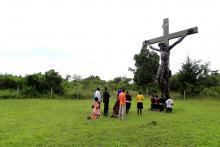
Francis marked the start of the jubilee on Dec. 8, when he opened the Holy Door at St. Peter’s Basilica in Rome. The yearlong celebration calls on Catholics to reflect on the theme of mercy and forgiveness and showcase a more inviting faith. That theme resonates in Africa, home to about 200 million Catholics. A sizable part of this population is tormented by war, violence from Muslim extremists, HIV/AIDS, and poverty.
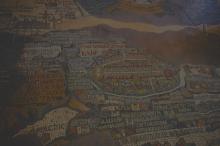
So what do we do about ISIS? The U.S. and the U.K. have decided that the answer is to bomb them. And it’s looking more and more like the answer will become to send troops.
But what do we do about ISIS? Does it make a difference whether I respond as an American or as a Christian? These days it’s hard to tell a distinction between the two. And that’s the question, and the answer, that scares me most.
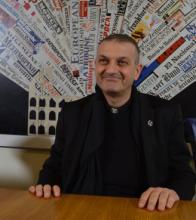
A Syrian priest held hostage for months by the ISIS terrorist group is certain his life was saved due to his interfaith work, despite being threatened with beheading by jihadists if he did not renounce Christianity.
The Rev. Jacques Mourad, a Syriac Catholic priest, was taken hostage in May from the Mar Moussa monastery, situated between the capital Damascus and the city of Homs. He and a volunteer from the monastery were forced into a car and driven for four days, during which time Mourad said he thought he would be killed.
“We could only perceive the sense of the desert. In that moment … I thought it was over,” he told members of Rome’s Foreign Press Association on Dec. 10, the first time he has spoken in detail about his odyssey since he escaped.
This week's Wrap was guest curated by Sojourners contributor Adam Ericksen. Read along for his top stories and notes from the week!
There was a lot of negativity in the news this week, but mercy also filled the airwaves. In case you missed it, here’s a list of some merciful events from the week:
1. Pope Francis Opens the Door to ‘Year of Mercy’ in a Time of Fear
Sure, we have some differences, but we’re still crushing on the Pope. “To pass through the holy door means to rediscover the infinite mercy of the Father who welcomes everyone and goes out personally to encounter each of them.”
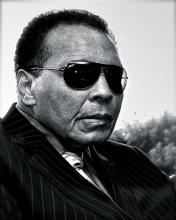
Muhammad Ali aimed a powerful and impassioned message at Republican presidential candidate Donald Trump on Dec. 9, saying that the recent global terrorism crisis has “perverted people’s views on what Islam really is.”
Ali became a Muslim and changed his name from Cassius Clay during the height of his career as one of the greatest boxers in history. His message came in a statement following a week in which Trump cast doubt on President Barack Obama’s assertion that several American “sporting heroes” practiced Islam.
“I am a Muslim, and there is nothing Islamic about killing innocent people in Paris, San Bernardino, or anywhere else in the world,” Ali said.
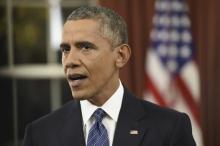
President Obama sought to reassure the nation amid renewed fears of terrorism the night of Dec. 6, saying the terrorist threat has “evolved into a new phase” of attacks hatched at home by extremists “poisoning the minds” of killers already on American soil.
“I know how real the danger is,” said Obama.
“The threat from terrorism is real, but we will overcome it. We will destroy ISIL and any other organization that tries to harm us,” Obama said.

I wonder if Pope Francis knows that he’s being used to justify bombing Syria.
After an all-day debate on Dec. 2, the House of Commons authorized the British government to begin bombing ISIS in Syria. Hours later, RAF Tornadoes attacked an oil field in eastern Syria.
During the debate, Caroline Spelman, the member of parliament who represents the Church of England in the Commons, noted that, “The Archbishop of Canterbury made it clear that, in his view, force might be necessary to keep the refugees safe.”
Then, citing Pope Francis, she said, “‘Where aggression is unjust, aggression is licit against the aggressor.’ These are views which I share, which is why I will support the motion.”
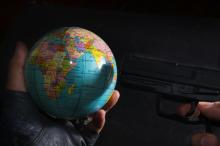
For the first week of Advent, my wife Amy preached about hope. She pointed out that having hope doesn’t mean necessarily that we see a way out of suffering. It does, however, give us a reason to try to keep working through it. We have to believe there’s another side to it. Another possibility. The potential for a new reality.
And that reality will never, ever be realized by responding to violence with more violence. It may make us feel better in the moment. It may seem to offer short-term relief. But ultimately, it makes everyone that participates become a little bit of what they hate. And the cycle continues.
Which story will we choose to try to live into?

Tashfeen Malik, the female suspect in the San Bernardino shooting spree, had expressed support for the Islamic State terrorist group and its leader, Abu Bakr al-Baghdadi, in a social media post, according to two U.S. officials.
While there was no indication yet that the extremist group, also known as ISIL or ISIS, directed the massacre in California that left 14 people dead, the posting represents the strongest link yet that the killings may have been rooted, at least partially, in terrorism.

EVERY TIME I travel from Erbil, the capital of Iraqi Kurdistan, to Dohuk, Iraq, my drivers point to the same bridge. This, they say, is where ISIS was stopped by U.S. air power, just 15 miles from Erbil. It is a vital reminder that Kurdistan has twice been a safe haven: in the 1991 aftermath of the first Gulf War, to protect the Kurds from Saddam Hussein, and again last year when ISIS was at the city gates.
When I look on the Nineveh Plain just south of Kurdistan, it’s hard not to recall Cyrus the Great, who once conquered this entire part of the world. The book of Isaiah recounts God’s words to the mighty king, a nonbeliever, one who didn’t follow the God of Israel: “For the sake of Jacob my servant, of Israel my chosen, I summon you by name and bestow on you a title of honor, though you do not acknowledge me” (emphasis added).
The chaos and violence in this region continues to drive people from their homes. Currently, Kurdistan is the temporary “home” of 1.1 million people fleeing ISIS. Most are people of faith—Muslims, Christians, and Yazidis. The ripple effects spread out to refugee camps from Jordan to Germany.
Many U.S. Christians don’t think of God when it comes to geopolitics. We sometimes reduce Christ “the Lord of all” to Christ “our personal savior.” We might not be comfortable with the idea that if Christ is truly sovereign, then that includes our global politics.
As people of faith, we never give up hope, even in the violent situation in the Middle East, which promises to get worse before it gets better. Here are three steps you can take to address the ISIS crisis and its violent ripple effects:
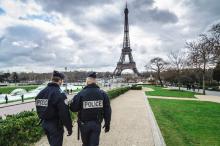
French authorities announced Dec. 2 that they shut down three radicalized mosques.
After the Nov. 13 attacks in Paris, the government proclaimed a state of emergency, which grants it wide latitude to conduct searches, make arrests, and ban public gatherings.
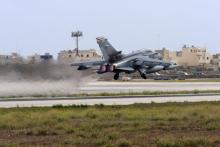
The British Parliament voted Dec. 2 to begin a bombing campaign in Syria in order to disrupt ISIS.
The vote took place after a contentious ten-hour debate in the House of Commons. Prime Minister David Cameron’s comments that those opposed to the bombing campaign are “terrorist sympathisers” hung in the background of the debate.

Hate crimes in America dipped across the board in 2014, except in the category of anti-Muslim crimes, which rose about 14 percent over the prior year. Given the barbaric Islamic State attacks in Paris last week and elsewhere recently, that latter trend seems destined to accelerate.
The presence of hate crimes against Muslims is no new phenomenon. Prior to the 9/11 attacks, there typically recorded between 20-30 hate crime against Muslims per year and after 2001 that number rose to nearly 500.
This summer, we saw the murder of three Muslim students in Chapel Hill, N.C. On Nov. 15 in London, a man pushed a Muslim woman into an oncoming underground train. And on Thanksgiving Day, a man in a taxicab in Pittsburgh, Pa., shot his driver in the back for being Muslim.
These incidents do not need to be listed as statistics to validate reality but they do need to be heard.

God’s been telling the story of restoration since Genesis when we were created selem Elohim, in the image of God. We were created into perfect communion with God. From Genesis 3 until the end of the Old Testament, we see a narrative of a people in exile and God giving opportunities for reconciliation and restoration of relationship that humanity is incapable of accepting. Reconciliation is an exchange of something worthless (our condition of sin) for something immeasurably worthy (communion with God).
In the New Testament we see a biblical narrative through Jesus of now-but-not-yet restoration. In Jesus we see the coming of the Kingdom of God and get to be reconciled back to God. We even get a glimpse of an eternity where there is no more death or mourning or crying or pain.
If we truly believe we are the image of God, it changes how we approach the image of God in the world. Our call then is to actively partner with God in taking the world somewhere.
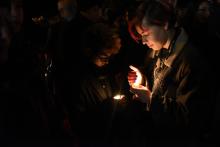
My son’s public school is amazing. The community is everything I had hoped it would be. There are several parent and grandparent volunteers who come in and out of the building daily to help in the classroom, playground and lunchroom. At first, I had wanted to make a big fuss about security and locking the front door during the school day. I thought that was going to be my platform, my soapbox. But after the crying incident, I decided that something in me had to change. I didn’t want to live in fear anymore. I didn’t want to let fear drive me. After some reflection, I had to shift that fear and move to a place of hope and love. Hope that this kind of violence would never touch my school community. Belief that our community is strong and committed and that love would ultimately win and have the last word.
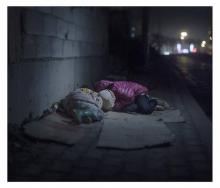
All of us are understandably sad about Paris — devastated. Many people have used striped profile pictures, candles, and flowers to express our collective solidarity. But in the wake of tragedy, almost half of the governors of the U.S. have responded with fear, announcing that they will do whatever they can to thwart the acceptance of Syrian refugees — from cutting funding for nonprofit resettlement agencies, to demanding religious screening tests.
If there’s one thing I learned from some of my friends who are refugees, it’s how to respond to grief. And there’s no one approach and they didn’t always get it right. But sometimes they did: Some refugees, in the shadow of shocking sadness, sang more than usual, prayed louder, invited more friends over for dinner, cooked their parent’s recipes. None of them responded with terrorism.
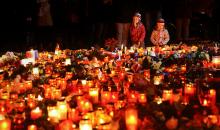
From a religious perspective, the hardest thing about confronting evil is the painful human tendency to only see it in others, in our enemies, and not see any on our side because of the blurred vision caused by the specks in our own eyes, to paraphrase the gospels. In discussing ISIS, we should clearly use the language of sin — the enormous sin of the ideological hate of ISIS finding its victims all over the world.
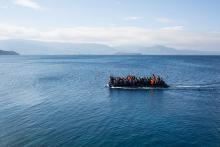
French president François Hollande announced on Nov. 18 that France will continue to resettle refugees.
Over the next two years, Hollande said that France would welcome 30,000 refugees from Syria and Afghanistan, among others. This is even more than his September commitment of 24,000.